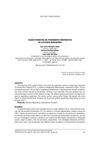Identificador persistente para citar o vincular este elemento:
https://accedacris.ulpgc.es/jspui/handle/10553/58579
| Campo DC | Valor | idioma |
|---|---|---|
| dc.contributor.author | Rodríguez Trueba, José Carlos | en_US |
| dc.contributor.author | Rodríguez Mateo, Heriberto | en_US |
| dc.contributor.author | Luján Henríquez, Isabel | en_US |
| dc.date.accessioned | 2019-12-16T18:15:04Z | - |
| dc.date.available | 2019-12-16T18:15:04Z | - |
| dc.date.issued | 2014 | en_US |
| dc.identifier.issn | 0214-9877 | en_US |
| dc.identifier.other | Dialnet | |
| dc.identifier.uri | https://accedacris.ulpgc.es/handle/10553/58579 | - |
| dc.description.abstract | El presente estudio tiene como finalidad analizar el valor predictivo de un instrumento de medición del Pensamiento Constructivo (CTI) en relación a la Eficacia Negociadora, medido a través del CEN II. Desde una aproximación conceptual se operativiza, a través de una puntuación cuantitativa, el concepto de eficacia negociadora y se delimita el concepto de Pensamiento Constructivo. Se realiza una investigación empírica a través de una muestra de 304 sujetos, distribuidos en diferentes grupos, según el grado y tipo de experiencia negociadora. Los resultados obtenidos confirman, entre otras cosas, que las personas que obtienen mayor puntuación en Pensamiento Constructivo Global, son las que tienen mayor eficacia negociadora, según puntuación obtenida a través del CEN II. | en_US |
| dc.description.abstract | The objective of the present study is to analyze the predictive value of a measuring instrument of Constructive Thinking (CTI), in relation to Negotiating Effectiveness, measured by CEN II. From a conceptual approach, the concept of negotiating effectiveness is operationalized through a quantitative score, and the concept of Constructive Thinking is also delimited. Empirical research was carried out through a sample of 304 subjects, divided into different groups according to the degree and type of negotiating experience. The results confirm, among other things, that people who score higher on Global Constructive Thinking, are those with greater negotiating effectiveness as score through CEN II. | en_US |
| dc.language | spa | en_US |
| dc.relation.ispartof | INFAD | en_US |
| dc.source | International Journal of Developmental and Educational Psychology: INFAD. Revista de Psicología [ISSN 0214-9877], v. 6 (1), p. 245-258 | en_US |
| dc.subject | 61 Psicología | en_US |
| dc.subject.other | Effective Negotiating | en_US |
| dc.subject.other | Constructive Thoughts | en_US |
| dc.subject.other | Eficacia Negociadora | en_US |
| dc.subject.other | Pensamientos Constructivo | en_US |
| dc.title | Validez predictiva del pensamiento constructivo en la eficacia negociadora | en_US |
| dc.title.alternative | Predictive validity of constructive thinking in negotiating effectiveness | en_US |
| dc.type | info:eu-repo/semantics/article | en_US |
| dc.type | Article | en_US |
| dc.identifier.url | http://dialnet.unirioja.es/servlet/articulo?codigo=6918645 | - |
| dc.description.lastpage | 258 | - |
| dc.identifier.issue | 1 | - |
| dc.description.firstpage | 245 | - |
| dc.relation.volume | 6 | - |
| dc.investigacion | Artes y Humanidades | en_US |
| dc.type2 | Artículo | en_US |
| dc.contributor.authordialnetid | No ID | - |
| dc.contributor.authordialnetid | 1892482 | - |
| dc.contributor.authordialnetid | 779083 | - |
| dc.identifier.dialnet | 6918645ARTREV | - |
| dc.identifier.ulpgc | Sí | es |
| dc.description.dialnetimpact | 0,0 | |
| dc.description.dialnetq | Q4 | |
| dc.description.erihplus | ERIH PLUS | |
| item.grantfulltext | open | - |
| item.fulltext | Con texto completo | - |
| crisitem.author.dept | Departamento de Psicología, Sociología y Trabajo Social | - |
| crisitem.author.fullName | Rodríguez Mateo, Heriberto Javier | - |
| crisitem.author.fullName | Luján Henríquez, Isabel María | - |
| Colección: | Artículos | |
Visitas
212
actualizado el 15-ene-2026
Descargas
152
actualizado el 15-ene-2026
Google ScholarTM
Verifica
Comparte
Exporta metadatos
Los elementos en ULPGC accedaCRIS están protegidos por derechos de autor con todos los derechos reservados, a menos que se indique lo contrario.
